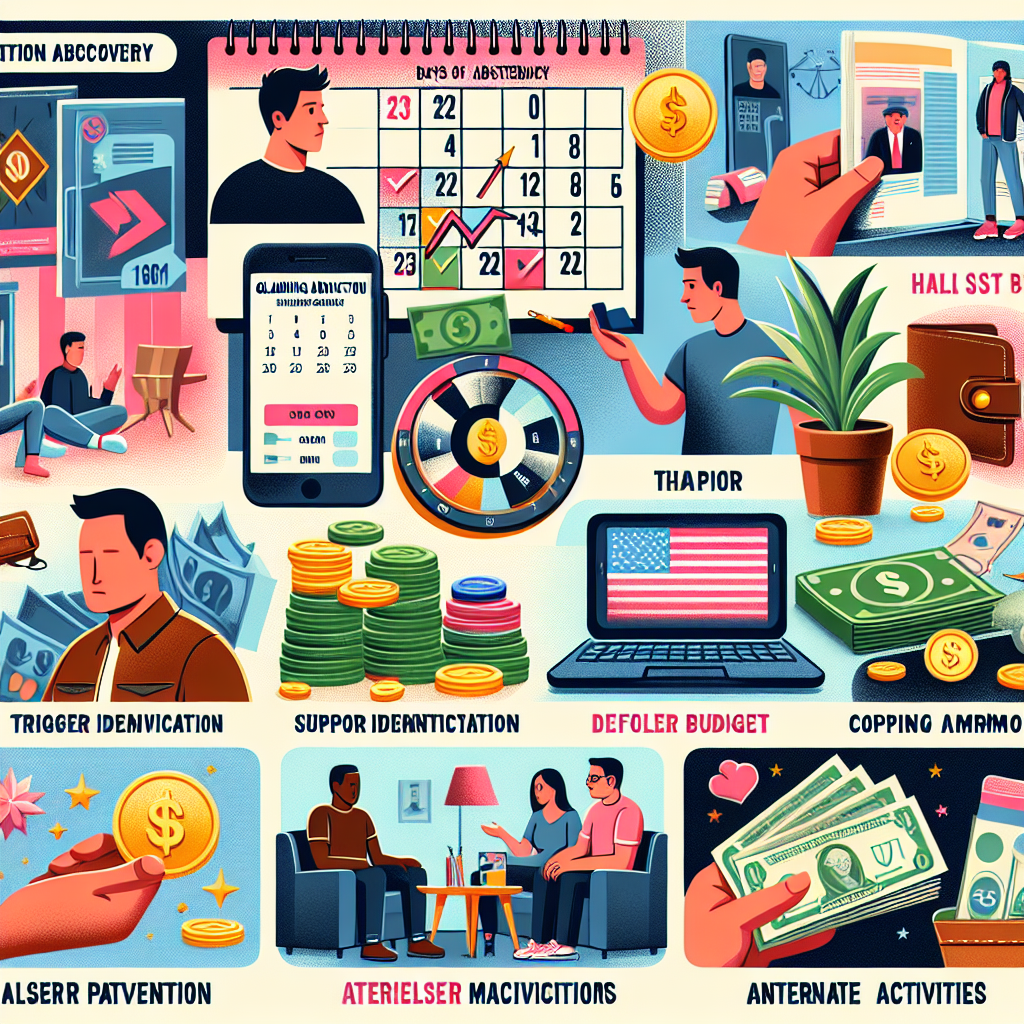-
Table of Contents

“Empower Recovery: Embrace Support, Build Resilience, and Foster Healthy Habits.”
Introduction
Gambling addiction, also known as compulsive gambling or gambling disorder, is a serious condition that can have devastating effects on an individual’s life, including financial ruin, relationship breakdowns, and mental health issues. Effective recovery strategies are essential for overcoming this addiction and regaining control. The best strategies for gambling addiction recovery typically involve a combination of professional treatment, support systems, and personal commitment. Key approaches include cognitive-behavioral therapy (CBT) to address underlying thought patterns and behaviors, participation in support groups such as Gamblers Anonymous for peer support, and the implementation of self-exclusion programs to limit access to gambling venues and online platforms. Additionally, developing healthy coping mechanisms, such as engaging in alternative activities and hobbies, and seeking financial counseling to manage debts and rebuild financial stability, are crucial components of a comprehensive recovery plan.
Effective Therapy Techniques For Gambling Addiction Recovery
Gambling addiction, often referred to as compulsive gambling or gambling disorder, is a serious condition that can have devastating effects on an individual’s life. However, recovery is possible, and there are several effective therapy techniques that can help individuals regain control and rebuild their lives. One of the most widely recognized and effective methods is Cognitive Behavioral Therapy (CBT). CBT focuses on identifying and changing the thought patterns and behaviors that contribute to gambling addiction. By addressing the underlying issues, individuals can develop healthier coping mechanisms and reduce the urge to gamble.
In addition to CBT, Motivational Interviewing (MI) is another powerful technique used in gambling addiction recovery. MI is a client-centered approach that helps individuals find their own motivation to change. Through empathetic and non-judgmental conversations, therapists guide clients to explore their ambivalence about gambling and strengthen their commitment to recovery. This technique is particularly effective because it empowers individuals to take ownership of their recovery journey.
Group therapy also plays a crucial role in gambling addiction recovery. Participating in group therapy sessions allows individuals to connect with others who are facing similar challenges. This sense of community and shared experience can be incredibly therapeutic. Group therapy provides a safe space for individuals to share their stories, offer support, and learn from one another. It also helps to reduce feelings of isolation and shame, which are common among those struggling with gambling addiction.
Another effective therapy technique is Family Therapy. Gambling addiction often affects not just the individual, but also their loved ones. Family therapy involves working with the entire family unit to address the impact of the addiction and to develop healthier communication and coping strategies. By involving family members in the recovery process, individuals can build a stronger support system and improve their chances of long-term success.
Mindfulness-Based Interventions (MBIs) are also gaining recognition as effective tools for gambling addiction recovery. These interventions, which include practices such as mindfulness meditation and yoga, help individuals develop greater awareness of their thoughts, emotions, and physical sensations. By cultivating mindfulness, individuals can learn to respond to cravings and triggers in a more mindful and intentional way, rather than reacting impulsively.
Furthermore, Self-Help Groups such as Gamblers Anonymous (GA) provide invaluable support for those in recovery. Modeled after the 12-step program of Alcoholics Anonymous, GA offers a structured approach to recovery that includes regular meetings, sponsorship, and a focus on personal growth and accountability. The sense of fellowship and mutual support found in these groups can be a powerful motivator for individuals seeking to overcome their addiction.
In addition to these therapy techniques, it is important to address any co-occurring mental health conditions that may be contributing to the gambling addiction. Many individuals with gambling addiction also struggle with issues such as depression, anxiety, or substance abuse. Integrated treatment that addresses both the addiction and any underlying mental health conditions can significantly improve outcomes.
Ultimately, the journey to recovery from gambling addiction is a deeply personal one, and what works for one person may not work for another. It is important for individuals to explore different therapy techniques and find the combination that best meets their needs. With the right support and a commitment to change, recovery is not only possible but can lead to a more fulfilling and balanced life.
Building A Support Network For Overcoming Gambling Addiction
Building a support network is a crucial step in overcoming gambling addiction. The journey to recovery can be challenging, but with the right support system, it becomes more manageable and less isolating. One of the first strategies to consider is reaching out to family and friends. These individuals often form the backbone of your support network, providing emotional stability and encouragement. Open communication with loved ones about your struggles and goals can foster a sense of accountability and understanding, which is essential for long-term recovery.
In addition to personal relationships, professional help is invaluable. Therapists and counselors who specialize in addiction can offer tailored strategies and coping mechanisms. Cognitive-behavioral therapy (CBT) is particularly effective, as it helps individuals identify and change the thought patterns that lead to compulsive gambling. Moreover, joining a support group such as Gamblers Anonymous can provide a sense of community and shared experience. These groups offer a safe space to discuss challenges and successes, and the collective wisdom of the group can be incredibly empowering.
Another important aspect of building a support network is educating yourself and those around you about gambling addiction. Understanding the psychological and physiological aspects of addiction can demystify the process and reduce feelings of shame or guilt. This knowledge can also help your support network better understand what you are going through, making them more effective in their roles. Educational resources, such as books, articles, and online forums, can provide valuable insights and practical advice.
Setting clear, achievable goals is another strategy that can aid in recovery. These goals can range from short-term objectives, like avoiding gambling for a day, to long-term aspirations, such as financial stability or improved relationships. Sharing these goals with your support network can provide additional motivation and a sense of accountability. Celebrating small victories along the way can also boost morale and reinforce positive behavior.
Financial management is another critical component of overcoming gambling addiction. Enlisting the help of a financial advisor or a trusted family member to manage your finances can prevent relapse by removing the temptation to gamble. Creating a budget and sticking to it can provide a sense of control and accomplishment. Additionally, setting up automatic transfers to savings accounts or other financial commitments can ensure that your money is being used constructively.
Physical and mental well-being should not be overlooked in the recovery process. Engaging in regular exercise, maintaining a balanced diet, and getting adequate sleep can improve overall health and reduce stress, which in turn can decrease the urge to gamble. Mindfulness practices, such as meditation and yoga, can also help manage cravings and improve emotional regulation.
Lastly, it is important to be patient and compassionate with yourself. Recovery is not a linear process, and setbacks are a natural part of the journey. Leaning on your support network during difficult times can provide the strength and resilience needed to continue moving forward. Remember that every step taken towards recovery, no matter how small, is a victory in itself.
In conclusion, building a robust support network involves a combination of personal relationships, professional help, education, goal-setting, financial management, and self-care. By integrating these strategies, individuals can create a strong foundation for overcoming gambling addiction and achieving lasting recovery.
Q&A
1. **Question:** What role does therapy play in gambling addiction recovery?
**Answer:** Therapy, particularly cognitive-behavioral therapy (CBT), plays a crucial role in gambling addiction recovery by helping individuals identify and change unhealthy thought patterns and behaviors related to gambling.
2. **Question:** How important is a support network in overcoming gambling addiction?
**Answer:** A strong support network, including family, friends, and support groups like Gamblers Anonymous, is essential in providing emotional support, accountability, and encouragement throughout the recovery process.
Conclusion
The best strategies for gambling addiction recovery include seeking professional help through therapy and counseling, such as cognitive-behavioral therapy (CBT); participating in support groups like Gamblers Anonymous; establishing a strong support network of family and friends; implementing self-exclusion programs to limit access to gambling venues and online platforms; developing healthy coping mechanisms and alternative activities to replace gambling; and addressing any co-occurring mental health issues or substance abuse problems. Consistent monitoring and commitment to these strategies are crucial for long-term recovery.



